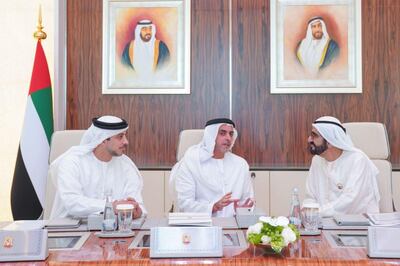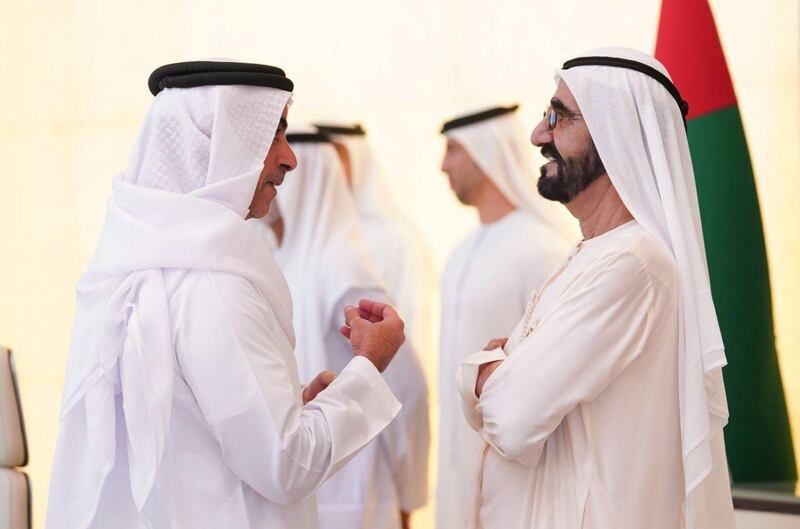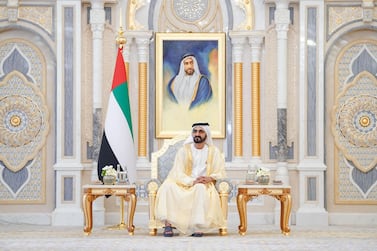The UAE government will create 20,000 new jobs for Emiratis in the next three years, the Prime Minister said on Sunday.
Sheikh Mohammed bin Rashid, also Vice President and Ruler of Dubai, made the pledge at a meeting of the Cabinet.
The roles will be in the banking, aviation, communication, insurance and property sectors.
The Cabinet also approved a fund of Dh300 million to train 18,000 Emirati jobseekers. Emiratisation is the national drive to get more citizens into the work force, particularly into private sector jobs.
'Managerial' positions in government will be reserved for Emiratis. Citizens will also be given priority for 160 job titles in the private sector. The list of jobs is yet to be released.
Sheikh Mohammed said companies that have failed to hit Emiratisation rates to date will "financially contribute with the government to support the Emiratisation programme".
"We will also issue an annual index for Emiratisation. And we will honour the people who support Emiratisation and will provide them with exceptional government incentives," he wrote on Twitter.
"Our economy is great, growing continuously, and providing millions of opportunities for Emiratis and residents."
He said "supporting Emiratisation is not incompatible with our ongoing efforts to attract international talent in all fields".
"Talent is what establishes a strong and diversified economy that provides great opportunities for citizens and residents," he said.
"UAE will remain a country of openness. And we will support the private sector financially and legislatively to achieve balance in the job market that will ensure stability for everyone."

The Cabinet made legal amendments to ensure Emiratis in the private sector receive a pension as they would in the public sector.
"We have also approved [a measure] to restrict recruitment in managerial and supervision jobs in government to Emiratis, and determine 160 jobs in the private sector with priority to Emirati citizens," he said.
Companies in the UAE are legally required to have a certain number of Emiratis in their workforce depending on the sector. A typical commercial company with more than 50 employees must ensure 2 per cent of its workforce are UAE citizens. That rises to 4 per cent for banks and 5 per cent for insurance companies, according to the 1999 law, updated in 2005.
Local banks have often exceeded that quota although many companies do not meet the targets at all. The government has traditionally taken a relaxed approach to enforcement and has focused more on making the private sector appealing to Emiratis, according to a legal briefing note by the law firm Al Tamimi & Co.
Free zones generally have no legal requirement to adhere to that law but are encouraged to act in the 'spirit' of Emiratisation.
The Prime Minister referred to his open letter to all government departments last month that set out the order of business after the summer break.
"We have started working on a new vision for planning the economic national development," he said on Sunday.
"And we will brainstorm on a set of ideas, programmes, motivating legislations for the economy soon. My message to all is we will not stop because in the UAE we don’t stop and we don’t like to rest."
In the letter on August 31 he wrote that ministers and senior officials must be on the front lines listening to "students and teachers, with widows and mothers, among the elderly, with the sick and in hospitals between doctors and workers".
Too many officials are sat in conferences "that have increased and consumed resources and the energy of those in charge".
“We are a government of achievements and not a government of conferences," he wrote at the time.
Sultan Al Yammahi, a former member of the Federal National Coucil who campaigned on Emiratisation, said it was right that private sector companies should contribute to the drive.
“Foreign companies are benefitting from deals worth millions of dirhams by doing business in the UAE. They should be responsible enough to either recruit Emiratis or at least train them," he said.
But he said semi-government owned companies should come under particular scrutiny.
“Before we question the private sector about Emiratisation, we should question national companies, banks and Etisalat," he said.
If such companies are found to have "neglected their Emiratisation targets, they should be held accountable".








